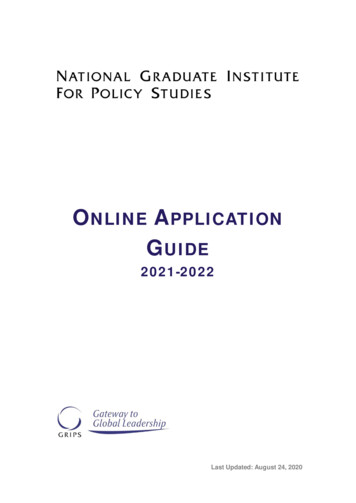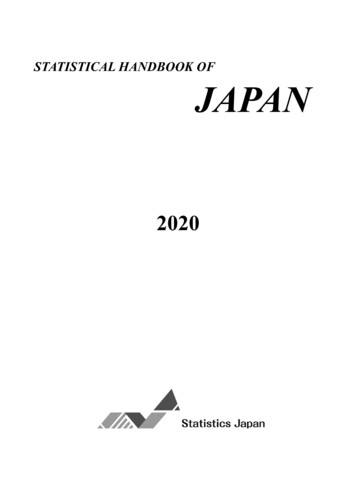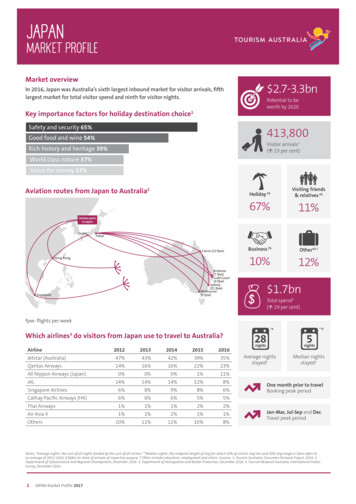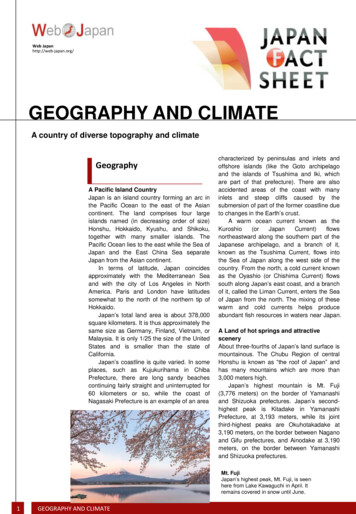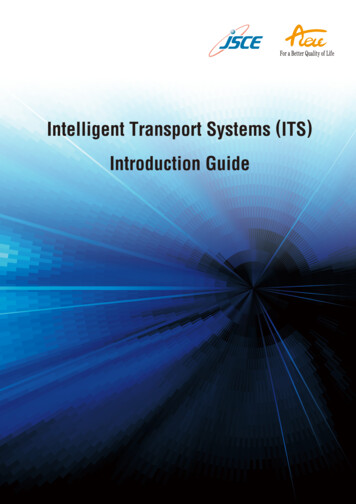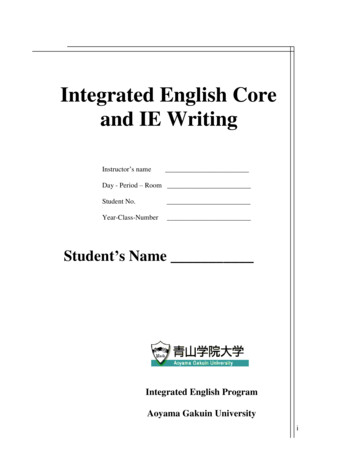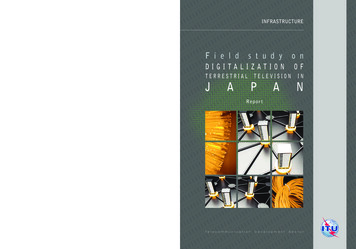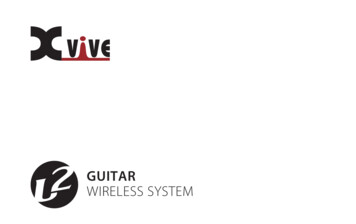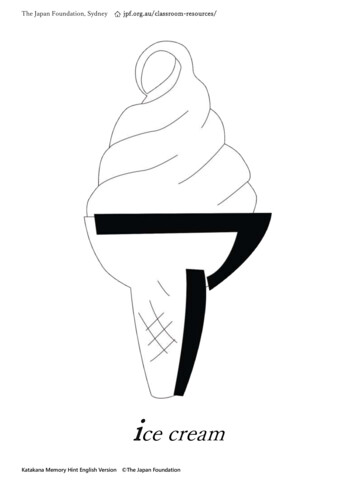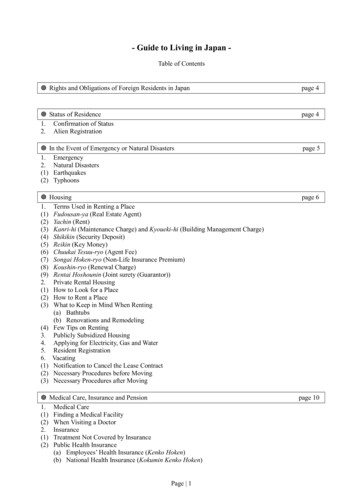
Transcription
- Guide to Living in Japan Table of ContentsRights and Obligations of Foreign Residents in Japanpage 4Status of Residence1. Confirmation of Status2. Alien Registrationpage 4In the Event of Emergency or Natural Disasters1. Emergency2. Natural Disasters(1) Earthquakes(2) Typhoonspage 5Housing1. Terms Used in Renting a Place(1) Fudousan-ya (Real Estate Agent)(2) Yachin (Rent)(3) Kanri-hi (Maintenance Charge) and Kyoueki-hi (Building Management Charge)(4) Shikikin (Security Deposit)(5) Reikin (Key Money)(6) Chuukai Tesuu-ryo (Agent Fee)(7) Songai Hoken-ryo (Non-Life Insurance Premium)(8) Koushin-ryo (Renewal Charge)(9) Rentai Hoshounin (Joint surety (Guarantor))2. Private Rental Housing(1) How to Look for a Place(2) How to Rent a Place(3) What to Keep in Mind When Renting(a) Bathtubs(b) Renovations and Remodeling(4) Few Tips on Renting3. Publicly Subsidized Housing4. Applying for Electricity, Gas and Water5. Resident Registration6. Vacating(1) Notification to Cancel the Lease Contract(2) Necessary Procedures before Moving(3) Necessary Procedures after Movingpage 6Medical Care, Insurance and Pension1. Medical Care(1) Finding a Medical Facility(2) When Visiting a Doctor2. Insurance(1) Treatment Not Covered by Insurance(2) Public Health Insurance(a) Employees’ Health Insurance (Kenko Hoken)(b) National Health Insurance (Kokumin Kenko Hoken)Page 1page 10
3. Pension (Nenkin)(1) Enrollment in National Pension Plan (Kokumin Nenkin)(a) Enrollment Procedures(b) Payment of the Premium(2) Enrollment in Employees’ Pension Insurance (Kousei Nenkin Hoken)(a) Eligibility for Enrollment(b) Enrollment Procedures(c) Payment of the PremiumEducationpage 13Employmentpage 14Employment Contract1. Employment Contract (Roudou Keiyaku)2. Terms and Conditions that Employers Must Specify in Writing3. Termination of Employment1.2.3.4.1.2.3.4.Life in the NeighborhoodGreetings to Your New NeighborsNeighborhood Association (Chonai Kai) and Residents’ Association (Jichi Kai)Garbage and RecyclingNoisespage 14page 15Learning Japanese and Maintaining Your Mother Tonguepage 17TaxesIncome TaxesResidence TaxesSales TaxesOthers (Automobile Taxes, etc.)page 17Traffic Rulespage 18Banks and Post Offices1. Banks2. Post Officespage 19Others1. Restrooms2. Indoor Etiquettes (Taking off Your Shoes)page 19Emergency Contacts1. Counseling Regarding Laws or Systems (Municipal Offices)2. Counseling Regarding General Concerns (International Associations)3. Other Counseling ServicesPage 2page 20
Commonly Used Japanese Words and Phrasespage 22Emergency Words and Phrases in Japanesepage 22Page 3
- Guide to Living in Japan Welcome to Japan. We hope your stay in Japan will be a safe and comfortable one.There are a few things to keep in mind to help your life in Japan to be smooth and trouble-free.The following covers some of the very basic information you will find useful in starting a new life inJapan.Rights and Obligations of Foreign Residents in JapanThe Constitution of Japan guarantees to equally entitle the fundamental human rights to foreigners whoreside in Japan unless such rights only apply to Japanese citizens by their nature.Japan has concluded principal human rights treaties such as the International Covenants on Human Rights(the International Covenant on Economic, Social and cultural Rights and the International Covenant onCivil and Policical Rights), the International Convention on the Elimination of All Forms of RacialDiscrimination, the Convention on the Rights of the Child and Convention on the Elimination of AllForms of Discrimination against Women.Also, regardless of nationality, all residents in Japan are required to pay national taxes (such as income tax,sales tax, etc.) and local taxes (such as residence tax, etc.).Status of ResidenceIn order for you to reside in Japan, you will need a status of residence. There are 27 different types ofqualifications depending on the activities and duration of stay in Japan.1.Confirmation of Status of ResidenceYour status of residence and duration of stay are dependent on the purpose of your entry to Japan. Checkthe type of status of residence and duration of stay specified in your passport. Note that you are forbiddenfrom engaging in activities other than those specified. Contact your local Immigration Bureaus for moreinformation.(4)(1)(1)(2)(2)(3) (4)(3)(4)Seal of landing permissionThis new design has beenimplemented since June 1, 2008.Seal of landingpermission(old version)Seal of landingpermissionThe seal indicates that you havebeen permitted(1) on June 1, 2009(1) (2) to stay for a short period oftime in Japan for the(2)purpose of sightseeing,(3)business or visiting relatives(3) for the duration of 90 days(4) and landed in Japan atTerminal 2 of NaritaInternational Airport.Source: Brochure for Immigration Control, Immigration Bureau, Ministry of Justice2.Resident RegistrationAs of July 9th, 2012, we have introduced a new residency management system. Under the new system,foreign nationals with a mid- to long-term stay in Japan are issued a resident card. There are someexceptions, which include those entering Japan on diplomatic or official status, temporary visitors, andPage 4
those staying for a period of less than 3 months. During their stay in Japan, foreign nationals who are 16years of age or older are required to carry the resident card at all times, even if they are also carryingpassports.In addition, it is necessary to register infants born in Japan at the local municipal office within 14 days ofbirth. The infants must file an application to obtain "Status of Residence" at a regional immigration officewithin 30 days of the date of birth if the infant will be residing in Japan more than 60 days after the date ofbirth.In the Event of Emergency or Natural Disasters1.EmergencyIf you are in need of an ambulance or involved in an emergency situation such as a fire, accident orrobbery or other crimes, stay calm and call for help. The following emergency numbers are available,depending on the type of emergency. All lines are open 24 hours a day.Emergency NumbersAmbulance119Dial(fire department)Fire119Dial(fire department)When you need anambulance due to a suddenillness or injuryCar accident110Dial(police station)Crime110Dial(police station)* These numbers are only for emergency uses and are not intended for inquiries. Ambulance servicesin Japan are free of charge. However, please refrain from requesting an ambulance if the case isminor and can be dealt with your own vehicle or a taxi.* Both 119 and 110 can be dialed from a land-line phone, public phone, cellular phone and PHS. It isnot necessary to give the specific address if dialing from a public phone as they can automaticallytrace the source of the call.How to make an emergency call from a public phonePick up the receiver, press the red emergency button and dial either 119 or 110. There is no need to insertcoins or calling cards.2.Natural DisastersJapan is a country that is prone to earthquakes. It is also frequently hit by typhoons between summer andfall. Therefore, it is very important to be always prepared for natural disasters so that in the event of adisaster, you can proceed without panicing and damage can be kept to a minimum. Knowing where toevacuate in the event of an emergency is also essential.Page 5
(1) EarthquakesJapan is known for its frequency of earthquakes, which sometimes cause subsequent tsunamis.Fire is the most common cause of collateral damage. After the shaking subsides, it is important to turn offheat sources such as the gas stove and heater as soon as possible to prevent fire. Shut off the gas byclosing the main valve and unplug all electric appliances. When evacuating, do so after switching off thecircuit breaker. In case of a fire, let the neighbors know and work together to extinguish or control the firebefore the fire department arrives.(2) TyphoonsTyphoons occur some time between July and October and are accompanied by heavy storms and rainfall.They can cause landslide as well as flooding.HousingIn Japan, there are three types of housing: private rental housing, publicly subsidized housing andprivately owned housing.In the case of private rental housing and publicly subsidized housing, it is important to keep in mind thatyou cannot live with someone that is not your family without obtaining permission from the landlord. Forthis reason, if you expect to live in a friend’s house temporarily immediately after your arrival in Japan, itis necessary to find your own place as early as possible.If you decide to rent a place in Japan, it is important to acquaint yourself with the customs and terms ofJapan’s rental system which include shikikin, reikin, koushin-ryo, etc. (explained below). Check with a realstate agent.1.Terms Used in Renting a Place(1) Fudousan-ya (Real Estate Agent)Fudousan-ya is an agent that specializes in finding houses or apartments, deals with selling/buying orreplacing houses, or acts as an intermediary to sell/buy or rent houses.(2) Yachin (Rent)Yachin means rent and is paid every month. Unless you are moving in at the beginning of the month, therent will be pro-rated for the first month.(3) Kanri-hi (Maintenance Charge) and Kyoueki-hi (Building Management Charge)Kanri-hi and kyoueki-hi are charges for the maintenance, electricity and general cleaning of the areas ofthe building (such as the stairs and hallways) that are shared by the renters. They are paid in addition to therent.(4) Shikikin (Security Deposit)Shikikin refers to the security deposit that is paid to the landlord (owner of the house) upon entering into alease contract. It is usually equivalent to one to three months’ rent. If the rent is outstanding or the place isleft damaged or in poor condition after the renter moves out, the money will be used to cover the cost andwhatever left will be refunded to the renter.(5) Reikin (Key Money)Reikin is the key money paid to the landlord as a gratuity. It is typically equivalent to one to two months ofrent and is non refundable. There are cases where reikin is not asked for.(6) Chuukai Tesuu-ryo (Agent Fee)Chuukai tesuu-ryo is paid to the real estate agent as a finder’s fee. It is usually half or one month’s rent.Page 6
(7) Songai Hoken-ryo (Non-Life Insurance Premium)This refers to a non-life insurance premium for furniture and other items that you may be required to coverupon entering into a contract.(8) Koushin-ryo (Renewal Charge)Koushin-ryo is the money paid to the landlord when renewing the contract. It is not always required.(9) Rentai Hoshounin (Joint Surety (Guarantor))You are required to have a rentai hoshounin or a guarantor who is financially liable in case you cannotafford rent or pay for necessary repairs. It is usually an individual who has a certain level of income;however, you can also use a guarantor company (hoshougaisha). Also, depending on where you live, themunicipality may offer a guarantor system (hoshouseido). For more details, consult the municipal office ora real estate agent.2.Private Rental HousingIf you decide to rent private rental housing, consult a real estate agent. It is important to know what youare looking for in terms of rent, size and other conditions. Note that typically you will need moneyequivalent to five to six months’ rent to enter into a lease contract.(1) How to Look for a PlaceVisit a real estate agent in the neighborhood to which you are planning to move. Tell them what kind ofplace you are looking for, such as in terms of rent, size and proximity to the station so they can find you aplace.You can also check the flyers posted on the storefront, or browse magazines and the Internet to get a pricerange and find available places in the area you plan to move to. Overseas students can go to the studentaffairs office of the university to search for information.(2) How to Rent a PlaceYou will enter into a contract when renting a house or an apartment. This contract is called a lease contract.The term of the contract is generally two years.The following documents and fees are required for the contract.Documents required for the contract1.2.3.4.Resident CardCertificate of earningsJoint Surety (Guarantor) or covenantPersonal Seal Registration, etc.Fees required for the contract1.2.3.4.First and next month’s rentShikikin (security deposit)Reikin (key money)Chuukai Tesuu-ryo (Agent fee), etc.If you add all the fees involved in renting aplace, the total will be equivalent to 5 to 6months’ rent.(3) What to Keep in Mind When Renting(a) BathtubsIf the place does not have a bath, you can take a bath at a public bathing facility called a sento, for anominal charge.(b) Renovations and RemodelingKeep in mind that you cannot renovate or remodel the place or let someone other than your family movein with you without obtaining the permission from the landlord. Needless to say, you are not allowed tosublease the whole or any part of the place.Page 7
Drive a nail or paint the wallSublease the place(4) Few Tips on RentingWhen renting housing, you may encounter a few impediments. Here are some tips that you may finduseful. Keep in mind that your local International Association may be able to help you as well.Cannot speak Japanese: Go to the real estate agent with someone who can speak Japanese. Even just asimple greeting will give the agent a good impression .Cannot find a guarantor: You can also use a guarantor company if you cannot find an individual.Consult the real estate agent. Another option is to check with your local municipal office to see if theyoffer a guarantor system.Cannot rent a place because you are a foreigner: Go on the Internet or ask around to see if your friendsor acquaintances know of any real estate agents that are more eager to help foreigners to find a place. Ifyou feel like you have been discriminated against because you are from another country, you canconsult some of the Human Rights Counseling Offices mentioned later.3.Publicly Subsidized HousingPublic housing consists of housing offered by local public entities (such as prefectures and municipalities)and public-service corporations (such as Urban Renaissance Agency that manages UR rental housing).Both will require specific conditions for foreign tenants such as being registered as a resident andsatisfying certain income standards. For more information, contact the local municipality or the UrbanRenaissance Agency that manages the public housing in which you are interested.4.Applying for Electricity, Gas and WaterAfter you have found a new place and entered into a lease contract, you will need to connect utilities soyou can get situated. Make sure you apply for electricity, gas and water before you move in. Proceduresmay vary depending on the area. The general guideline is as follows.ElectricityWhen?Who to contact?GasWaterAfter you have moved in After you have moved in After you have moved inand received the keyand received the keyand received the keyWater Division of the localLocal electric companyLocal gas companymunicipality, etc.Page 8
What to do?Switch the circuit breaker Call the gas company to set Call the Water Division ofon to turn on the electricity. up a date and time to open the local municipality andTake the postcard attached the gas valve to activate the set up an appointment toto the breaker, fill out the service.activate the service. Ininformation such as yoursome cases, you may needname, address and date ofto turn the water meter toservice connection and mailopen the valve. If this is theit out as soon as possible. Ifcase, you will need to fillyou cannot find theout the provided postcardpostcard, you will need towith information such ascontacttheelectricyour name, address andcompany directly.date of service connectionand mail it out as soon aspossible.Rental housing usually does When you go look at thenot come with a gas stove place or when you enterfor cooking. You will need into a contract, ask the realto buy one before the day estate agent or the landlordyou have the appointment whether you will havewith the gas company.access to water right away.Note5.Resident RegistrationAs of July 9, 2012, foreign nationals who have newly entered Japan, and have been staying as mid- tolong-term residents are requested to register their residential address at the local municipal office. Thisshould be done within 14 days after they have decided their residence. It is necessary to show a residentcard (or passport if the resident card will be obtained later) when applying for registration of residentialaddress. In cases where the householder is a mid- to long-term status foreign resident, original documents(along with Japanese translation) of marriage certificate, birth certificate, or other documents certifyingthe relationship with the members of the household must be provided.6. VacatingMake sure you clarify the necessary procedures for vacating when you enter into a lease contract. It is notuncommon to run into problems due to renter’s misunderstanding or not following the requiredprocedures.(1) Notification to Cancel the Lease ContractIf you are living in rental housing, you are required to give the landlord the notification that you wouldlike to cancel the lease contract one or two months in advance. Details on the necessary procedures arespecified in the lease agreement. (You may have to notify the landlord in writing.)(2) Necessary Procedures before MovingRemember to notify the utility companies (electric, gas, water and phone), post office, financialinstitutions and thecity hallof the address change. If you have children, you will be required to takenecessary procedures for transferring schools.(3) Necessary Procedures after MovingIt is important to file the proper registrations of change of address to the local municipal office when onehas moved to a new residence. A moving certificate and a resident card are required for this procedure. Anational health insurance notification can be handled by the local municipal office at the same time.In addition, the change of address for driver’s license, the procedure for transferring children to a newschool, or seal registration at a new local municipal office is also required if necessary.Page 9
Medical Care, Insurance and Pension1.Medical CareWhen receiving medical treatment in Japan, it is best to bring someone who can speak Japanese sincemany medical facilities do not offer services in foreign languages. Also, this may be important in order toaccurately communicate the symptoms you have. Some prefectures post information regarding medicalfacilities and their capacity in foreign languages on their website so it is recommended to check whetherthe staff at your local hospital or clinic can speak your native language.There are two types of medical facilities in Japan: hospitals that are fully equipped for in-patient care andcomplete examinations and clinics that specialize in family practice.It is advised to go see a doctor at a local clinic first and then receive specialized treatment at a largerhospital if necessary. Do some research on the medical facilities in your area to be prepared in case of anemergency. You may find the website of your prefecture helpful to gather some information.Also, it is important to visit the municipal office or look through ethnic media guides to consciously lookfor information regarding medical treatment, such as flu vaccinations, offered locally.Hospitals for severe casesClinics for primary careFor treating minor symptoms such ascold and stomach achesFor treating serious cases, symptoms orinjuryReferralWhen there is a serious medicalconditionWhen surgery or in-patient careis necessaryCLINICClinicsHOSPITALHospitals(1) Finding a Medical FacilityYou can find a medical facility by looking through public relations magazines published by municipalities,searching on the Internet or looking in a phone book. Your neighbors probably will be a good source aswell.There are also following organizations that offer phone consultations in foreign languages.NPO Corporation AMDA International Medical Information CenterInformation on medical facilities with staff that speak foreign languages and information regarding themedical welfare system in Japan are provided in multiple languages.English, Thai, Chinese, Korean, Spanish: 9 am to 8 pm, everydayTokyo CenterAvailable Portuguese: 9 am to 5 pm, Mondays, Wednesdays and FridaysTel: 03-5285-8088 languages Tagalog: 1 pm to 5 pm, WednesdaysVietnamese : 1 pm to 5 pm, ThursdaysKansai CenterAvailable English and Spanish: 9 am to 5 pm, Monday through FridayTel: 06-4395-0555 languages Chinese: 10 am to 1 pm, Tuesday, 1 pm to 4 pm, WednesdaysPage 10
Portuguese: 10:30 am to 2:30 pm, MondaysTokyo Metropolitan Medical Institution Information Service “Himawari”Information on medical facilities with staff that speak foreign languages and information regarding themedical system in Japan are provided in multiple languages.AvailableTel: 03-5272-0303English, Chinese, Korean, Thai, SpanishlanguagesAlso, you can conduct a search on medical facilities that offer services in foreign languages. You cansearch by location at sp (Japanese only).(2) When Visiting a DoctorIf you have any medical restrictions due to your religion or allergies, it is important to notify thereceptionist or the nurse in advance.Make sure you bring your health insurance card to medical facilities. This allows you to pay only a certainpercentage of the medical expenses. If you do not present the health insurance card at the hospital or youdo not have any health insurance, you will be required to pay the medical expenses in full, which is likelyto be very expensive.In addition, it may be best if you bring your Certificate of Resident Registration or your passport foridentification purposes. Also, if you are currently taking any medication, bring it with you on your visit.2.InsuranceIf you live in Japan, you are required to have some form of public health insurance. There are two types ofhealth insurance in Japan: Employees Health Insurance (kenko hoken) offered to employees working atcompanies and factories and National Health Insurance (kokumin kenko hoken) for self-employed orunemployed people.If you are enrolled in public health insurance, you are generally required to pay only 30% of the medicalexpenses which are standardized throughout the country. However, if you do not have public healthinsurance, you will end up paying a considerable amount of money since you are responsible for payingall the expenses.(1) Treatment Not Covered by InsuranceAlthough as a general rule public health insurance will cover 70% of the total medical expenses, it isimportant to know that there are treatments that are not covered by insurance.(Treatment not covered by insurance)Normal pregnancy and childbirthAbortion performed for non-medical reasonsHealth check-up and complete physical examination (Some municipalities may partially cover theexpenses.)ImmunizationPlastic surgery and orthodonticsInjuries or accidents that occurred on the way to work or at work (This will be reimbursed by workers’compensation insurance (rousai hoken).)An additional charge for a bed, for example when staying in a private room at the hospitalExaminations, surgeries, treatments and drugs not covered by health insurance(2) Public Health Insurance(a) Employees’ Health Insurance (Kenko Hoken)Page 11
Since Employees’ Health Insurance is processed by the company you work for, check with your employerregarding the enrollment procedures. After you become enrolled, you will receive an insurance card. Makesure you do not lose this card since it is a proof of having insurance.The premium for the insurance will be deducted from your pay. The premium amount is dependent on afew factors such as your salary. Your employer pays half of the premium and you pay the other half.(b) National Health Insurance (Kokumin Kenko Hoken)If you are a registered alien qualified to stay in Japan and are not enrolled in your company’s employee’shealth insurance scheme, you must enroll in National Health Insurance. In addition, if the duration of staywas set to less than three months at the time of entry and you have been allowed to extend your stay inJapan to over three months, you will be required to join the National Health Insurance(This does not applyto those who are staying in Japan for only a short period of time.).You will need to file the paperwork at the National Health Insurance Division of the local municipality atwhich you completed your alien registration. Once you enroll in the National Health Insurance, you willremain enrolled unless you file the appropriate paperwork. If the beneficiary’s status changes for suchreasons as the beneficiary having enrolled in Employee’s Health Insurance, a child is born or thebeneficiary is deceased, it must be reported to the municipal office within 14 days. The same applies incase you lose or damage your insurance card.Change of address must be reported accordingly as well. If you are moving, go to your local municipaloffice to notify the date you are moving. Once you move to a new place, report the address change to themunicipal office in your new neighborhood within 14 days.If you are leaving Japan, you will be required to bring documents such as your insurance card, seal (if youhave one), Certificate of Alien Registration and your plane ticket and file the necessary paperwork (unlessyou are leaving the country temporarily).You yourself will be required to pay the premium. You can pay at the bank or a municipal office bybringing the notification of payment sent by the municipality with you or you can make a deposit via abank transfer from your bank account. There are cases where a public official makes a home visit tocollect the premium.The premium amount varies among municipalities and is determined on the basis of factors such as theincome level and number of people in the household. If you have lived in Japan for less than a year, andthus you received no income in Japan in the previous year, the premium for the first year will be theminimum level and it will change according to your income from the following year. In addition, if youare 40 or over and less than 65 years of age, you will be required to pay the premium for nursing insurance(kaigo hoken) as well.3.Pension (Nenkin)Public pension is part of the social security system that provides with a pension to the elderly, disabled andbereaved. It provides financial support for the person concerned during old ege, disablement orbereavement.(1) Enrollment in National Pension Plan (Kokumin Nenkin)If you live in Japan and are 20 years of age or over and less than 60 years of age, you are required to enrollin the National Pension Plan regardless of your nationality. Even if you are enrolled in the Employees’Pension Insurance Scheme (Kousei Nenkin Hoken) at work, you still need to enroll in the National PensionPlan as well.(a) Enrollment ProceduresIn order to enroll in the National Pension Plan, you will be required to go to the pension plan window atthe municipal office in your area. (A seal will not be required if you yourself file and sign the applicationPage 12
form.) However, if you are enrolled in Employees’ Pension Insurance, it is not necessary to file theapplication for the National Pension Plan as you will automatically be enrolled.(b) Payment of the PremiumRegardless of the income level, the premium is 14,980 yen for each month (as of fiscal year 2012). Youwill receive the notification of payment from Japan Pension Service for the whole year in April. You caneither pay at a post office, bank or convenience store using the notification of payment or pay via a banktransfer.If it is difficult to pay the premiums for reasons such as your income level is not sufficient, you may beentitled to waive the premium in full or partially. Also, if you are a student, apply for the Special PensionPayment Exemption for Students (which may not be available at certain schools) to postpone the payment.If you are qualified for exemption of the premiums (except for those who have obtained legal exemption),as a general rule you must file the appropriate paperwork every year. Talk to the staff at the pension plandepartment for more details.(2) Enrollment in Employees’ Pension Insurance (Kousei Nenkin Hoken)(a) Eligibility for EnrollmentJust like Employees’ Health Insurance, employers are required to provide their full-time employees withEmployees’ Pension Plan if they are a company or factory that has more than five employees or if they area corporation (regardless of their size). Also, if you are a part-time worker and your work hours and workdays account for three quarters or more of the weekly work hours of regular workers, you are also obligedto enter the insurance scheme.(b) Enrollment ProceduresApplication for the Employees’ Pension Plan is filed at the company you work for. Ask your employer orthe pension office for more details.(c) Payment of the PremiumThe employer and employee split the payment obligations on a fifty-fifty basis. The premium amount isdependent on the employee’s monthly salary and bonus and is paid through the employer. Ask youremployer or the pension plan office for more details.EducationIn general, education in Japan consists of three years in kindergarten, six years in elementary school, threeyears in junior high school, three years in high school and four years in university (two years in juniorcollege). The nine-year education in elementary and junior high schools, from 6 to 15 years old, ismandatory in Japan.On the basis of stipulations in the International Covenants on Human Rights, non-Japanese childrenbetween ages 6 and 15 are entitled to receive an education at a public school. They are not only acceptedfree of charge but are provided with necessary extra lessons and activiti
- Guide to Living in Japan - Welcome to Japan. We hope your stay in Japan will be a safe and comfortable one. There are a few things to keep in mind to help your life in Japan to be smooth and trouble-free. The following covers some of the very basic information you will find
